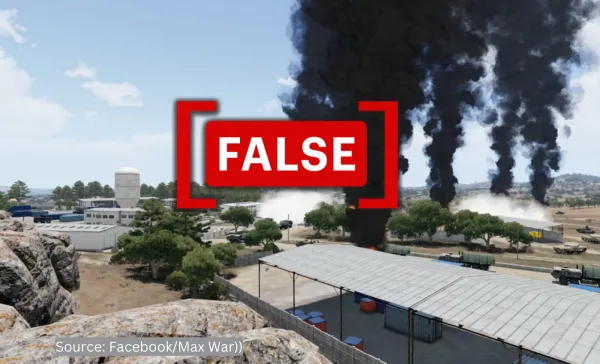August 4 2023
Video alleging that Russia destroyed NATO weapons is a video game clip

The Verdict False
The clip is from a military simulation game called Arma 3.
Context
A video circulating on Facebook with over 800 reactions and 100 comments falsely alleges that "Russia destroyed NATO weapons and ammunition depots in Ukraine." The footage, however, is from a popular military game called Arma 3.
Video analysis and verification
Using Google Reverse Image Search, we found similar images from Arma 3. Next, we examined the footage closely to extract meaningful information, noting the landscape, structures, and objects. We cross-referenced these with the game developer Bohemia Interactive's Community Wiki page, which catalogs objects used in the game, confirming that the footage was from Arma 3.
The Wiki showed numerous other identical objects visible in the video, including a diesel storage tank, a rusty cistern, and blue cargo containers.
Video games used for propaganda
This is not the first time footage from Arma 3 has been used for war-related propaganda. Fact-checking organizations and other news outlets, including USA Today and France 24, have previously debunked similar claims.
Bohemia Interactive has addressed the recent spread of their games falsely presented as footage from actual conflicts, like Russia's invasion of Ukraine. Their PR manager, Pavel Křižka, emphasized the importance of collaborating with reputable media outlets and fact-checkers to combat the spread of fake news effectively.
The developers also shared valuable tips to distinguish video game footage from real-life events. These include paying close attention to the video resolution and sound effects.
The verdict
A video alleging that Russia destroyed NATO weapons is a clip from a popular video game, Arma 3. Therefore, we have marked this claim as false.


